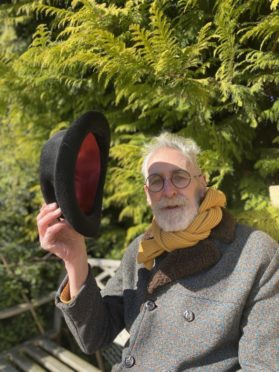John Byrne’s anticipated audio play Tennis Elbow has been a story 44 years in the making.
A follow-up to his 1977 Edinburgh Festival hit Writer’s Cramp, Tennis Elbow premiered on Pitlochry Festival Theatre‘s new Soundstage platform.
The play, which was directed by Elizabeth Newman and runs until May 8, will be instantly recognisable to long-time Byrne fans. But though it caters to those in the know, new audiences needn’t fear the repetitive strain of the title – his latest work stands alone just fine.
Where Writer’s Cramp remembered the fictional life of (tragically mediocre) artist Frances Senaca McDade, Tennis Elbow “returns” the tale of his estranged “sometime wife”. Aptly named, Pamela Crichton Capers (Kirsty Stuart) is another hapless Scottish artist scrambling for recognition – and remuneration.
Feisty but chronically unfortunate, the “true” story of how Pam’s “female genius was at first ignored, then misunderstood, and finally triumphant” is, like McDade’s in Writer’s Cramp, told to us in memoriam.
Pam’s life unfolds in a series of flashbacks framed as letters, telegrams, readings and conversations – with narrator Maureen Beattie‘s trademark rigorous enunciation setting us up for a send-up from the get-go.
Cast in perfect harmony
Stuart’s warm performance makes protagonist Pam instantly likeable, even (especially) when she’s up to mischief.
And as she faces ups and downs, from prison to marriage, fame to illness, Pam’s exchanges become more poignant (though no less witty). Each one represents a thread in the rich tapestry of a life – and showcases a vibrant supporting cast.
Pam’s scenes with her “Mama” (Louise Jameson) stand out, with barbs and affection traded in equal measure. In an argument over Pam’s paternity, Mama pleads: “Please Pam, I was at an impressionable age!”
“Hang it up mum,” Pam retorts. “You were thirty-four!”
The whole performance, in keeping with Byrne’s style, revels in language.”
Meanwhile Pam’s faithful friend Brazil (Jessica Hardwick) steals every scene she’s in – all of which are written in rhyme.
Byrne: Lover of language
In fact, the whole performance, in keeping with Byrne’s style, revels in language. And much like Pam herself, it doesn’t apologise for being difficult.
Its dense, convoluted sentences, alliteration and witty wordplay may at first seem unapproachable to an uninitiated audience. But, pretty quickly, Byrne’s signature classical cadence lulls the listener into submission.
There are some missed beats; some moments where the seriousness threatens to overpower the satire, and you find yourself thinking: “Where’s the punchline?”
But rather than worrying about fathoming every line, you can simply let the dialogue pull you along. If you miss one joke, the next is right around the comma.
In fact, along with an expert use of sound effects and music, the play’s demanding language serves to enhance its audio-based format, as it forces the listener to stay engaged.
And although it was recorded in advance, the play benefits from the actors performing the dialogue “live” in real-time with one another.
This makes it feel as immediate as radio. Indeed after the premiere, Byrne says – between drags of a roll-up cigarette – that the experience “took me back to listening to plays on the wireless as a young man”.
A feast for the ears
An entirely auditory experience, Tennis Elbow was created remotely as part Pitlochry Festival Theatre’s Soundstage project, conceived as a result of lockdown.
Logistically, the set-up is well-handled. An easy-to-follow Zoom link leads patrons through the “theatre” – a lively animation followed a simple image of a lone spotlight shining on empty boards. It is a little sad, and a little atmospheric, which feels appropriate for a platform born out of the pandemic.
Halfway through, the spotlight turns to a sweet animation of drawn curtains signalling the interval. A link to a virtual “bar” appears, with the invitation to chat to fellow theatregoers. The format is friendly, and the video chats – if a little awkward – work well.
All told, it doesn’t hold a candle to going out and seeing a play in person. But then, it isn’t trying to.
And this way, you can listen in your pyjamas – bonus!


